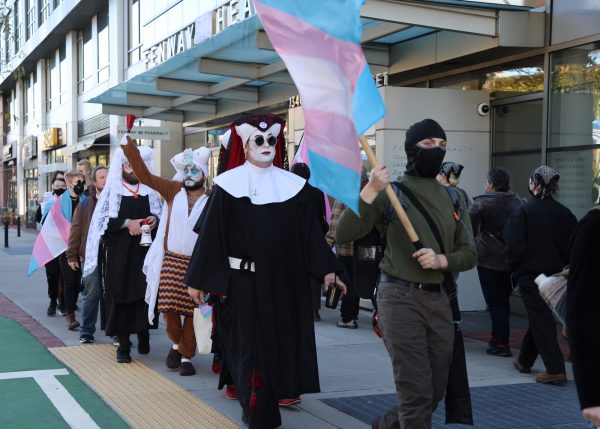Fenway Health discontinued gender-affirming care services for patients under 19 years old in order to comply with new federal requirements from the Trump administration, according to an Oct. 13 statement released by the medical provider.

The decision comes after the Health Resources and Services Administration announced last month it will deprioritize programs offering “hormones and puberty blockers” for patients under 19, according to the statement.
The U.S. Department of Health and Human Services wrote its actions surrounding federal health activities are “guided by gold-standard, evidence-based science,” in a statement to The Daily Free Press.
Fenway Health is a federally qualified health center, meaning it must remain compliant with HRSA regulations to continue delivering care to New Englanders, according to the statement released by the provider last week.
Josh Rovenger, legal director at GLBTQ Legal Advocates and Defenders, or GLAD Law, said the Trump administration is prohibited from tying federal funding to state-wide gender-affirming care programs because of an injunction granted by a federal judge in March.
“The administration is putting institutions like Fenway Health in impossible positions [by] trying to use these threats to cut down this care,” Rovenger said. “The law does not compel these institutions to do that.”
The decision has prompted outrage among the LGBTQ+ community in Boston. Dozens gathered outside the health center Oct. 17 to rally against the policy switch, which ACT UP Boston — a nonpartisan group originally started to end the AIDS crisis — organized.
More than 100 protesters chanted slogans, including “Say it loud and say it clear, trans youth are welcome here” and “No borders, no nations, trans liberation.”
Some protesters said they began their gender transition at Fenway Health or had family members who use its gender-affirming services. Other protesters with ties to Fenway Health are considering finding a new health provider.
Gerry Scoppettuolo, a retired HIV medical case manager and member of ACT UP Boston, said he was shocked by how Fenway Health has changed since David Scondras, one of Boston’s first openly gay city councilors, founded the center in 1971.
Isabella O’Connell, a nursing student at Salem State University, said the announcement was a “total gut punch.”
“There’s a feeling of whiplash in the trans community, where over the past five [to] 10 years, we’ve made strides to access health care and civil rights to keep us safe,” O’Connell said. “To have them torn away like this is a huge loss and concern for us all.”
Sister Lida Christ of The Boston Sisters of Perpetual Indulgence said the decision shows “our transgender children are on the chopping block.”
At another protest outside Fenway Health Oct. 20, Teddy Walker, a Boston resident working in education, said the center was surrendering to federal threats without a fight.
“They’re giving up out of caution,” Walker said. “They’re making a cowardly deal with the Trump administration.”
Despite the change in policy, Fenway Health CEO Jordina Shanks wrote the center is committed to its LGBTQ+ patients, according to a statement released Tuesday.
“This change does not reflect our values, our belief that gender-affirming care saves lives, or our unwavering commitment to the transgender and gender-diverse community,” Shanks wrote. “It reflects a painful reality that we are working to change.”
One protester said Fenway Health’s actions set a “dangerous precedent” and will only heighten demand for these services, subsequently overwhelming other gender-affirming care providers in the city.
City Councilor Henry Santana wrote in a post on X that denying gender-affirming care for transgender youth placed them in “unacceptable risk, threatening their mental and physical well being.”
According to a 2022 study published by Jama Network, gender-affirming care has been associated with reduced risk of severe depression and suicidal ideation in people between the ages of 13 and 20. The study found transgender patients who received hormone therapy and puberty blockers were 60% less likely to experience moderate to severe depression and 73% less likely to have suicidal thoughts.
“For trans youth, for queer youth or gender-expansive youth, it’s life-changing access. This is life-saving access,” Shaplaie Brooks, executive director for the Massachusetts Commission on LGBTQ Youth, said.
She added the reductions in care are “devastating.”
“[Fenway Health] were devastated to have to make an impossible choice between following their mission and staying open for residents who rely on them,” Councilor Sharon Durkan, who recently spoke with the center, said during a Boston City Council meeting this Wednesday.
The Boston City Council passed a resolution supporting gender-affirming care at the meeting.
A Monday statement from the Massachusetts Commission on LGBTQ+ Youth called Fenway Health’s statement “deeply flawed” and “shortsighted and avoidable.” However, Brooks said it was important to band together in the aftermath.
“We can’t do anything for us without all of us,” she said.
At the Oct. 17 protest, Casey Pons, the board chair for the Massachusetts Transgender Political Coalition, said there is a network for trans youth who will “continue to love and fight.”
“We are here,” said Michelle Tat, a board member of the MTPC, at the same protest. “We see you. We hear you. We are going to fight tooth and nail to protect you.”


















































































































